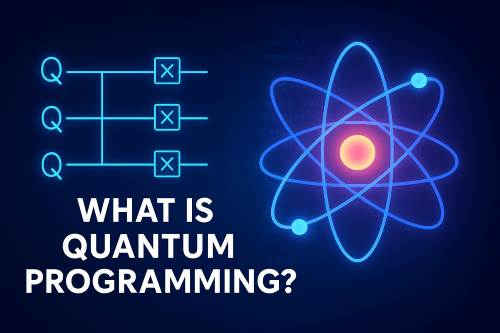Quantum computing is a rapidly evolving field of computer science that utilizes the principles of quantum mechanics to perform computation. It has the potential to solve certain problems much faster than classical computers, especially those involving complex simulations, optimization, cryptography, and data analysis.
Table of Contents

What is Quantum Programming?
Quantum programming is the next big leap in computing—where code meets the strange rules of quantum mechanics. Unlike traditional programming, it uses quantum bits (qubits) that can exist in multiple states at once, enabling ultra-fast processing and solving complex problems. Whether you’re into AI, cryptography, or futuristic tech, understanding quantum programming opens the door to the future of software development.
How’s Interesting Quantum Computing
- Speed: Quantum computers can tackle certain problems exponentially faster than classical computers. This advantage is particularly relevant for tasks that involve searching large databases or solving complex mathematical equations.
- Parallelism: Quantum computers can process multiple possibilities simultaneously, thanks to the concept of quantum superposition. This parallelism allows them to explore multiple solutions at once, which is advantageous for certain algorithms.
- Quantum Entanglement: Quantum entanglement is a phenomenon where the state of one quantum particle is dependent on the state of another, even when they are separated by large distances. This property can be harnessed for various applications, including secure communication (quantum cryptography).
- Factorization: Quantum computers can efficiently factorize large numbers, which has implications for breaking classical cryptographic schemes like RSA.
- Quantum Simulation: Quantum computers can simulate quantum systems more efficiently than classical computers. This capability has applications in fields such as material science, chemistry, and drug discovery.
- Optimization: Quantum computing algorithms, like the Quantum Approximate Optimization Algorithm (QAOA), can be used to find optimal solutions for certain optimization problems more efficiently.
- Building a quantum computer involves complex and sophisticated hardware, and we are still in the early stages of developing practical and scalable quantum systems. However, you can start experimenting with quantum computing using quantum simulators and cloud-based quantum computing platforms.
To program a quantum computer, you’ll need to use a quantum programming language or a quantum development framework.

Quantum programming languages and frameworks
- Qiskit: Developed by IBM, Qiskit is an open-source quantum programming framework for building and running quantum circuits. It supports multiple backends, including real quantum devices and simulators.
- Cirq: Developed by Google, Cirq is an open-source quantum programming framework that allows you to write quantum circuits and run them on simulators and quantum processors.
- Quipper: Developed by Microsoft Research, Quipper is a functional programming language for quantum computing. It is designed to express quantum algorithms at a high level.
- Forest: Offered by Rigetti Computing, Forest is a platform for quantum programming that uses the PyQuil library. It allows you to work with quantum circuits and quantum simulations.
- ProjectQ: ProjectQ is an open-source quantum computing framework that can be used to write quantum algorithms and execute them on quantum simulators and actual quantum hardware.

In Conclusion
These languages and frameworks provide abstractions to work with quantum gates, circuits, and algorithms, allowing you to experiment with quantum computing concepts and explore potential applications. Keep in mind that quantum computing is still in its early stages, and building and programming quantum computers can be quite challenging. But these tools provide a good starting point for learning and experimenting with this fascinating technology.
FAQ’s
1. What is superposition in quantum computing?
Superposition is a fundamental principle in quantum computing where a quantum bit (qubit) can exist in multiple states (both 0 and 1) simultaneously, unlike classical bits which can only be 0 or 1.
2. How does superposition benefit quantum computing?
Superposition allows quantum computers to process vast amounts of data and perform multiple calculations at once, leading to exponential speedup in problem-solving.
3. Can you explain superposition in 5 different programming languages?
Here’s an example of implementing a quantum superposition using various quantum computing libraries:
- Python – Qiskit (IBM’s Quantum Computing Framework)
- JavaScript – Qiskit.js (Quantum Computing in JavaScript)
- C++ – Quantum++ Library (High-Performance Quantum Simulations)
- Julia – Yao.jl (Quantum Computing Library for Julia)
- Rust – Quil-based Quantum Computing
4. What is the role of the Hadamard gate in superposition?
The Hadamard gate (H-gate) is a quantum gate that transforms a qubit into an equal superposition of |0⟩ and |1⟩, enabling parallel computation in quantum algorithms.
5. Can quantum superposition be observed directly?
No, observing a qubit collapses its superposition into a definite state (either 0 or 1), which is why quantum measurement is probabilistic.
6. What are some real-world applications of quantum superposition?
Superposition is essential for quantum cryptography, optimization problems, drug discovery, material science simulations, and artificial intelligence advancements.





